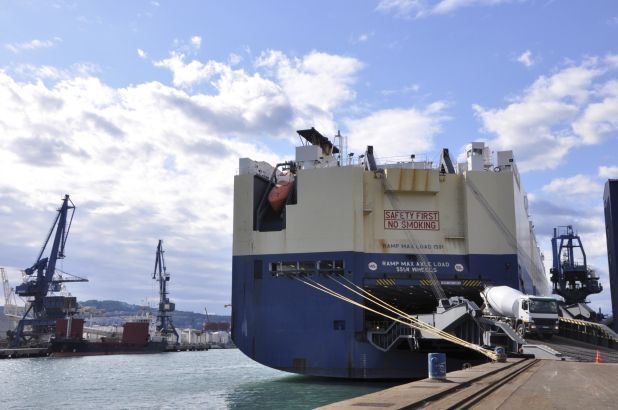
Dieter Grabelsjek is the CEO at Con-Truck Logistic GmbH, a hauler that ships vehicles and utility vehicles of all kinds to West Africa. Mr Grabelsjek is an established player and could therefore inform TruckScout24 (TS24) about the growing buyers’ market for used utility vehicles from Europe. This information encourages us, as a European dealer, to serve the market as soon as possible.
TS24: In your opinion, how has the export of used utility vehicles from Europe to Africa changed over the last 10 years?
Grabelsjek: I perceive the whole market as stable with a moderate growth trend. It is difficult for me to provide a detailed description because I have several competitors. The volume of our utility vehicle exports has steadily grown by 20 to 30 percent in recent years.
TS24: Do you think that is due to general growth in volume, or did you manage to get a larger share of the export business in West Africa?
Grabelsjek: Most likely both. African customers are very particular in the selection of their vehicles. They look for models by European manufacturers that have high quality and are easy to maintain. Manufacturers such as Mercedes or MAN have become established in recent years and are known to the local mechanics. It is therefore very difficult for new manufacturers to get established. This generates a second market in the container sector that deals with shipping spare parts. It can be summarized that the African market currently still demands utility vehicles that can be repaired without major technical effort.
TS24: Which countries in West Africa are your largest buyers?
Grabelsjek: Nigeria is by far the largest market for the export of utility vehicles, followed by Ghana and the neighboring countries. This obviously excludes large /government short-term projects that generate very high demand at regular intervals.
TS24: Has this business situation been prevailing for a long time? Or has Nigeria become a hub in recent years?
Grabelsjek: Nigeria has always been the largest market, due to the size of its population.
TS24: Which vehicle types do you ship most frequently?
Grabelsjek: When you consider the number if items, small transporters lead, followed by box and tarpaulin trucks and tractor units.
TS24: Are there seasonal fluctuations in utility vehicle export?
Grabelsjek: There are hardly any seasonal fluctuations. January is a weak month, since African customers tend to return home over Christmas. Otherwise, there are nowadays no specific months that are stronger or weaker.
TS24: Are there regional preferences for vehicle types?
Grabelsjek: It could be said that most of the heavy utility vehicles go to Nigeria.
TS24: Who mainly organizes the export of the vehicles with you? The buyers or the sellers?
Grabelsjek: In our case, buyers from Africa. The buyer trusts us but not necessarily the dealer from which he buys. That’s why Buyers from Africa, who usually spend their entire capital on a deal, prefer to organize the export directly with us. Immediately after the purchase, they place further arrangements, etc. into our hands.
TS24: Who distributes the vehicles in African countries? Who are your customers?
Grabelsjek: Most of them are importers and intermediates, comparable to the importers common in Europe. They, in turn, sell the products to local dealers or end customers.
TS24: Have these structures changed during recent years? Has the sector become more professional?
Grabelsjek: Obviously. We always try to speed up the procedures and make the whole process more professional. When everything is well organized, buyers can come to Europe at shorter intervals and generate more turnover.
TS24: Is there considerable fluctuation among the importers, or are the market participants always the same?
Grabelsjek: They are more or less always the same. Obviously, there are always some new importers emerging.
TS24: Can European dealers contact these importers directly?
Grabelsjek: You can definitely do that. The problem is trust. You must first earn trust or be recommended. Visual inspections are always requested.
TS24: How will West Africa develop as a buyers’ market for used utility vehicles from Europe?
Grabelsjek: The demand is there and will most certainly grow. Also, spare parts supply will play an increasing role. It will be difficult for non-European manufacturers to enter this market. West Africans have made positive experiences with European vehicles, and this keeps most Asian manufacturers out of the market. Most local demand can only be serviced by European manufacturers. West Africa will therefore always remain a large customer for second-hand utility vehicles from Western Europe.